The Relevance of Yu.M. Lotman’s Legacy: the Conclusion of the Jubilee Year
DOI:
https://doi.org/10.21146/0042-8744-2023-12-203-211Keywords:
Lotman, textology, culturology, semiotics of culture, history of Russian culture, mechanisms of culture, Lotman studies.Abstract
This article is an analysis of Yu.M. Lotman’s legacy and academic Lotman studies in the current scientific humanitarian discourse following the results of the jubilee year. The 100th anniversary of the birth of the outstanding scientist was widely celebrated in the international scientific community in 2022. The final event was the large-scale international conference “Thinking Worlds by Yu.M. Lotman” organized by Nanjing University in December. Philologists, cultural scientists and cultural philosophers discussed various aspects of Lotman’s scientific and creative heritage. They emphasized that the semiotic model of cultural interpretation developed by Lotman serves as an interdisciplinary model in a large circle of modern humanities. Scientists from all over the world focused on the universal significance of his theoretical ideas, on the potential of their application in the analysis of the text as a cultural phenomenon and cultural processes. The reports showed that Lotman’s works on the theory and history of culture, his cultural semiotics contributed both to the methodological re-equipment of literary studies and the formation of cultural science. The semiotic approach proposed by the scientist made it possible to identify various levels of the existence of the text in culture, its relationship with its other intellectual forms and social practices. Both structural-semiotic and historical-cultural strategies used by Lotman in the analysis of Russian culture, complementing and enriching each other. These strategies enabled the scholar to go beyond the ideological schemes of Soviet literary studies and show the work of notable Russian authors such as Karamzin, Pushkin, Lermontov, Gogol as a determining factor in the semiotization of the intellectual history of Russia, the source of its semantic formation and cultural dynamics. Special attention was paid to the perspective of the development of Lotman’s philosophical and cultural concept in the research of national cultures as well as intellectual, artistic and social practices of modernity.

